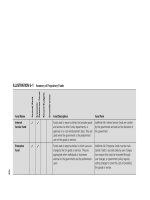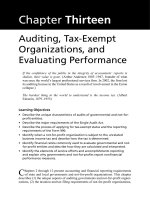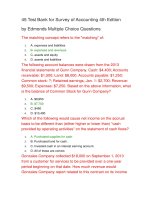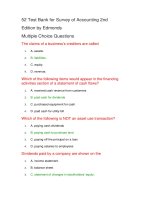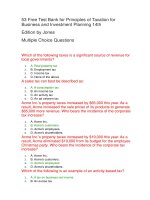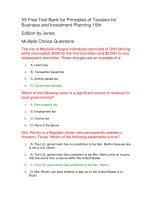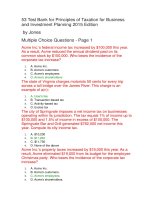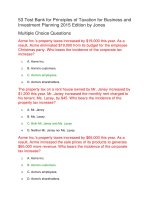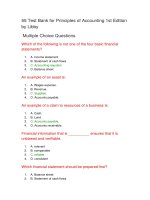55 test bank for principles of accounting 1st edition
Bạn đang xem bản rút gọn của tài liệu. Xem và tải ngay bản đầy đủ của tài liệu tại đây (62.93 KB, 12 trang )
55 Test Bank for Principles of Accounting 1st Edition
n by Libby Multiple Choice Questions - Page 1
Which of the four basic financial statements provides a snapshot of
the business on a particular day?
1.
A. Balance sheet
2.
B. Income statement
3.
C. Statement of cash Flows
4.
D. Statement of owner's equity
The rules of accounting are known as:
1.
A. Security and Exchange Commission (SEC).
2.
B. Financial Accounting Standards Board (FASB).
3.
C. American Institute of CPAs (AICPA).
4.
D. Generally Accepted Accounting Principles (GAAP).
Which financial statement links together the Income Statement and
the Balance Sheet?
1.
A. Statement of cash flows
2.
B. Statement of owner's equity
3.
C. Statement of operations
4.
D. Statement of financial position
Unearned revenue is an example of a(n):
1.
A. Liability.
2.
B. Revenue.
3.
C. Asset.
4.
D. Expense.
Which of the following is not one of the four basic financial
statements?
1.
A. Income statement
2.
B. Statement of cash flows
3.
C. Accounting equation
4.
D. Balance sheet
The primary responsibility for setting the rules of accounting rests
with the:
1.
A. Financial Accounting Standards Board (FASB).
2.
B. Generally Accepted Accounting Principles (GAAP).
3.
C. Security and Exchange Commission (SEC).
4.
D. American Institute of CPAs (AICPA).
Which of the following is considered an internal user of accounting
information?
1.
A. Production manager
2.
B. Supplier
3.
C. Investor
4.
D. Customer
The _________________ outlines how the profits (or losses) are
shared.
1.
A. Stock certificate
2.
B. Partnership agreement
3.
C. Corporate charter
4.
D. Financial statements
Which of the following is considered an external user of accounting
information?
1.
A. Production manager
2.
B. CEO
3.
C. IRS
4.
D. Controller
An example of a claim to resources of a business is:
1.
A. Cash.
2.
B. Land.
3.
C. Accounts payable.
4.
D. Accounts receivable.
All of the following include activities of external users of accounting
information except:
1.
A. Evaluating the risk of lending money to a business.
2.
B. Determining the amount of supplies on hand.
3.
C. Deciding whether to buy, sell or hold stock in a company.
4.
D. Assessing whether the company has paid the correct amount of taxes.
Land is an example of a(n):
1.
A. Liability.
2.
B. Asset.
3.
C. Revenue.
4.
D. Expense.
Which of the following would not be considered an external user of
accounting information?
1.
A. Bank
2.
B. Supplier
3.
C. Manager
4.
D. Investor
Which of the following is not a characteristic of an asset?
1.
A. It is a resource controlled by the business.
2.
B. It has measurable value.
3.
C. It is incurred to generate revenue.
4.
D. It is expected to provide future benefits.
The Sarbanes-Oxley Act of 2002 requires that top managers
maintain an audited system of:
1.
A. Accounting.
2.
B. Reporting.
3.
C. Internal control.
4.
D. Financing.
A bank is most likely a(n) ___________ user of accounting
information.
1.
A. external
2.
B. internal
3.
C. governmental
4.
D. managerial
Financial information that is __________ ensures that it is unbiased
and verifiable.
1.
A. relevant
2.
B. comparable
3.
C. reliable
4.
D. consistent
An example of an asset is:
1.
A. Wages expense.
2.
B. Revenue.
3.
C. Supplies.
4.
D. Accounts payable.
Which financial statement should be prepared first?
1.
A. Balance sheet
2.
B. Statement of cash flows
3.
C. Income statement
4.
D. Statement of owner's equity
Which financial statement includes only those activities that result in
cash changing hands during the period?
1.
A. Income statement
2.
B. Balance sheet
3.
C. Statement of cash flows
4.
D. Statement of owner's equity
Which of the following represents the fundamental accounting
equation?
1.
A. A + L = OE
2.
B. A - L = OE
3.
C. OE + A = L
4.
D. L - OE = A
Claims a business owes are called owners' equity when they are
held by:
1.
A. Creditors.
2.
B. Suppliers.
3.
C. Employees.
4.
D. Investors.
The governmental agency that supervises the work of the Financial
Accounting Standards Board (FASB) is known as the:
1.
A. Generally Accepted Accounting Principles (GAA).
2.
B. Securities and Exchange Commission (SEC).
3.
C. Public Company Accounting Oversight Board (PCAOB).
4.
D. American Institute of CPAs (AICPA).
Resources a business owns are called:
1.
A. Liabilities.
2.
B. Owner's equity.
3.
C. Revenues.
4.
D. Assets.
Inventory is an example of a(n):
1.
A. Liability.
2.
B. Revenue.
3.
C. Expense.
4.
D. Asset.
In a business, who has the primary responsibility for following
GAAP and preparing fair financial statements?
1.
A. Management
2.
B. The accountants
3.
C. The CPA
4.
D. The SEC
Which of the following is not one of the types of business activities
included on the statement of cash flows?
1.
A. Investing
2.
B. Operating
3.
C. Financing
4.
D. Reporting
55 Free Test Bank for Principles of Accounting 1st
Edition by Libby Multiple Choice Questions - Page 2
Technology and the low cost of computers have resulted in:
1.
A. Increased complexity in accounting systems.
2.
B. Higher fees charged by public accountants.
3.
C. Small businesses handling their own bookkeeping.
4.
D. An abundance of accounting reports.
Which of the following is not a required element of the title on a
financial statement?
1.
A. The company's name
2.
B. The reporting date or period
3.
C. The name of the financial statement
4.
D. The preparer's name
The following information is reported for Manco Company for the
month of March. Determine net income.
1.
A. $(21,500)
2.
B. $144,500
3.
C. $21,500
4.
D. $73,000
The area of accounting which primarily serves the decision making
needs of internal users is:
1.
A. Financial accounting.
2.
B. Bookkeeping.
3.
C. Auditing.
4.
D. Managerial Accounting.
Accounting is an information system designed to:
1.
A. Provide information to external users only.
2.
B. Provide information to internal users only.
3.
C. Capture a business's activities and communicate results to all decision
makers.
4.
D. Handle the record keeping of a business but other functions must be
performed by a CPA.
When a company distributes profits to its owners the result is a(n):
1.
A. Decrease in profits.
2.
B. Decrease in assets and owner's equity.
3.
C. Increase in owner's equity.
4.
D. Increase in assets.
A company pays $3,400 for the current month utilities. What is the
effect on the accounting equation?
1.
A. Assets increase $3,400; no effect on liabilities; equity increases $3,400.
2.
B. Assets decrease $3,400; liabilities decrease $3,400; no effect on equity.
3.
C. Assets decrease $3,400; no effect on liabilities; equity decreases $3,400.
4.
D. Assets increase $3,400; liabilities increase $3,400; no effect on equity.
A company purchases equipment for $45,000 cash. What is the
effect on the accounting equation?
1.
A. Assets increase $45,000; no effect on liabilities; equity increases $45,000.
2.
B. Assets decrease $45,000; liabilities decrease $45,000; no effect on equity.
3.
4.
C. No effect on the accounting equation because assets increase and
decrease by the same amount.
D. Assets increase $45,000; liabilities increase $45,000; no effect on equity.
What business type has two or more owners and unlimited liability?
1.
A. Corporation
2.
B. Sole proprietorship
3.
C. Partnership
4.
D. Retailer
A company reported revenue of $100,000 and a net loss of
$12,000. What amount was reported as expenses?
1.
A. $112,000
2.
B. $12,000
3.
C. $88,000
4.
D. $100,000
Accountants who are employed by a single business or nonprofit
organization work in:
1.
A. Public accounting.
2.
B. Private accounting.
3.
C. A CPA firm.
4.
D. Governmental accounting only.
Assets should originally be recorded at:
1.
A. Market value.
2.
B. Replacement cost.
3.
C. Historical cost.
4.
D. Amount owed on the asset.
If owners contribute $50,000 to start a new business what is the
effect on the accounting equation?
1.
A. Assets increase $50,000; no effect on liabilities; equity increases $50,000.
2.
B. Assets decrease $50,000; liabilities decrease $50,000; no effect on equity.
3.
4.
C. Assets decrease $50,000; no effect on liabilities; equity decreases
$50,000.
D. Assets increase $50,000; liabilities increase $50,000; no effect on equity.
Which of the following is not one of the three major ways that a
business can be organized?
1.
A. Partnership
2.
B. Sole Proprietorship
3.
C. Corporation
4.
D. Wholesaler
What is the effect on the accounting equation if a company earns
revenues of $23,000 on account?
1.
A. Assets increase $23,000; no effect on liabilities; equity increases $23,000.
2.
B. Assets decrease $23,000; liabilities decrease $23,000; no effect on equity.
3.
4.
C. Assets decrease $23,000; no effect on liabilities; equity decreases
$23,000.
D. Assets increase $23,000; liabilities increase $23,000; no effect on equity.
Which of the following would not be an objective of an external user
analyzing a company's financial statements?
1.
A. Assessing the company's ability to pay its debts.
2.
B. Predicting the future profitability of the company.
3.
4.
C. Determining whether the company should drop an unprofitable product
line.
D. Understanding the financial position of the company.
Which of the following is an example of a service company?
1.
A. Wal-Mart
2.
B. Home Depot
3.
C. American Airlines
4.
D. Ford Motor Company
The income statement reports:
1.
A. Revenues, assets and expenses.
2.
B. Net income or loss for the period.
3.
C. Only sales amounts paid in cash.
4.
D. The financial position on a particular date.
Boeing would be an example of what business type?
1.
A. Service company
2.
B. Merchandiser
3.
C. Manufacturer
4.
D. Retailer
How would the accounting equation be affected if a company
obtains a loan for $100,000 from a bank?
1.
A. Assets increase $100,000; no effect on liabilities; equity increases
$100,000.
2.
B. Assets decrease $100,000; liabilities decrease $100,000; no effect on
equity.
3.
C. Assets decrease $100,000; no effect on liabilities; equity decreases
$100,000.
4.
D. Assets increase $100,000; liabilities increase $100,000; no effect on
equity.
Which of the following is not a merchandiser?
1.
A. Target
2.
B. Best Western
3.
C. Staples
4.
D. Macy's
A company reported assets of $12,000 and liabilities of $2,500,
what amount would be reported for owner's equity?
1.
A. $14.500
2.
B. $9,500
3.
C. $12,000
4.
D. $2,000
On December 31 of the current year, a company reported the
following items on its balance sheet: Cash $10,500; Accounts
receivable $5,200; Inventory $2,300; Equipment $102,400;
Accounts payable $12,000; Notes payable $56,000. What amount
should be reported as owner's equity?
1.
A. $108,400
2.
B. $52,400
3.
C. $120,400
4.
D. $188,400
One advantage of the corporate form of business over the other
forms of business is:
1.
A. Limited liability.
2.
B. Ease of formation.
3.
C. Separate taxation.
4.
D. Lower legal fees.
_______ are the standards of conduct for judging right from wrong.
1.
A. Ethics
2.
B. Rules
3.
C. Internal controls
4.
D. Conducts
Companies which make products from raw inputs are known as:
1.
A. Service Companies.
2.
B. Wholesalers.
3.
C. Retailers.
4.
D. Manufacturers.
A company reported total equity of $82,000 on its December 31,
2009 balance sheet. The following information is available for the
year ended December 31, 2010: What are the total assets of the
company as of December 31, 2010?
1.
A. $167,000
2.
B. $202,000
3.
C. $85,000
4.
D. $132,000
If a company purchases supplies on account for $5,000, what is the
effect on the accounting equation?
1.
A. Assets increase $5,000; no effect on liabilities; equity increases $5,000.
2.
B. Assets decrease $5,000; liabilities decrease $5,000; no effect on equity.
3.
C. Assets decrease $5,000; no effect on liabilities; equity increases $5,000.
4.
D. Assets increase $5,000; liabilities increase $5,000; no effect on equity.
